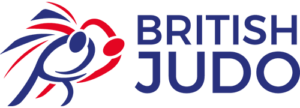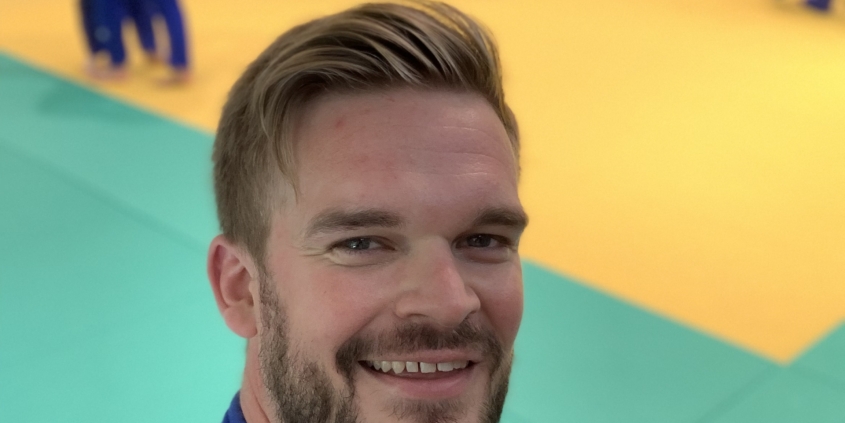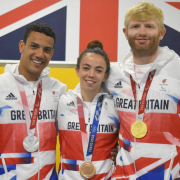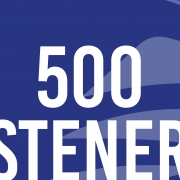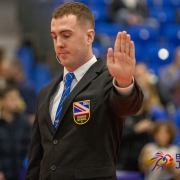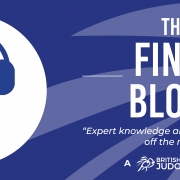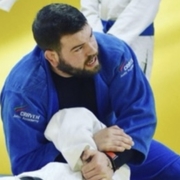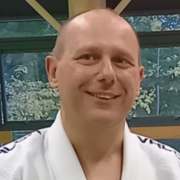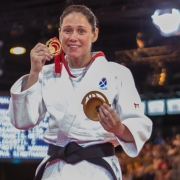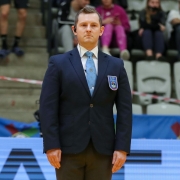Meet the Coach – Chris Barry
Name: Chris Barry
What is your judo background?
I started Judo aged 9 at Highland Budokan Judo Club and by 10 years-old I was winning medals at Mini Mon level and training 2-3 times a week. Soon enough, I was winning medals at Scottish Championships and events all over the UK, while now training 4-5 times per week at clubs throughout Ross-shire after moving to Tain Judo Club. This level of performance was maintained and I was placing at British Championships without medalling for several years, while also struggling with several injuries. A broken arm in the Scottish Championships final one year ruled me out of the British Championships a few months later and the following year a fracture in my knee joint in training did the same. 2003, however, was finally my year, having qualified for the British Championships as Scottish Champion. I went in unseeded and was drawn to fight the top seed in my first match, going down by an early yuko. I fought my way back into the match and caught him with a left seoinage for ippon. From this point on, things went smoothly as I won all my contest by ippon on the way to the final. Unfortunately, I was beaten in the final by a superior opponent but was proud of my day’s work. This result got me a place on the GB Squad and I competed in European events the following year. More injuries were to follow, limiting my ability to train to the required level to perform at my best. I moved to Glasgow for university in 2005 and tried to maintain training by travelling through to Edinburgh 2-3 times a week and finding sessions around Glasgow to join. Injury struck again, setting me back further and my knee was now in such a state that I could no longer tolerate the training load required to compete. I competed in my final British ranking event in 2008, winning a silver medal at the Scottish Open and continued Judo in a social capacity.
How did you get into coaching?
I got into coaching through a chance encounter with a former training partner and opponent, David Millar, in 2013. By this time, I had been working for Glasgow Warriors rugby team as a Performance Analysis intern for 3 years and was working in a bar to supplement this with income. David started working in the same place and we chatted about his Judo club that he’d started in Glasgow. I already had my Level 1 coaching qualification in Judo and David asked if I wanted to help out at his club for a bit of extra money. He put me through my Level 2 qualification during this and I largely ran the club for a year or so. In 2014, I applied for, and was offered, the job of Performance Analyst with British Judo. At first, this job was largely video and data-based work but, as I built relationships with the coaching staff, I started to work with fighters on the fight strategy for certain opponents. This developed, particularly in the VI programme, into on-the-mat work with the fighters on their technical and tactical Judo. In early 2020, I travelled to the German Open with the VI team to coach, sitting in the chair for Chris Skelley and many of our development-level fighters before coaching on the training camp that followed the competition. When COVID-19 hit, we had to adapt the delivery of the training programme by working in smaller fighter groups. As such, I stepped-in to lead sessions where required and worked well with the fighters on their technical judo while also designing and running randori and conditioning sessions. The Home Nation Support Coach programme was formed in 2021 and I was given a place on this to gain experience and develop my coaching skills. Shortly after starting this programme, I was offered the role of Performance Analyst & Technical Coach on the World Class Performance Programme.
What is your coaching role?
My role is that of Performance Analyst & Technical Coach which requires me to balance the video and data analysis for the programme with delivery of training sessions and competition/camp-based coaching.
What is your coaching philosophy?
My preference is to help the fighter to explore and discover their own learning. Ultimately, they are the ones who have to deliver the performance so I encourage them to develop their own understanding, while providing guidance and additional information, as required. I also value commitment and hard work that is focussed towards the goals they are trying to achieve.
What motivates you as a coach?
My greatest motivator is seeing the work we have done together resulting in competition success. There is no greater sense of achievement for me than that. I loved competition as a fighter and that is no different as a coach.
What has been your most memorable moment(s) as a coach?
I wasn’t strictly in a coaching role at this point but it could be said that the work I did for this was coaching. After Baku IBSA Grand Prix in 2021, I debriefed the event with Elliot Stewart with a particular focus on his contest with the World no.1. I had noticed an exchange early in the fight in which Elliot had dominated the gripping and movement, causing his opponent to panic and lose attacking ability. I asked Elliot to watch this and tell me what he saw. He recognised the same thing as me and we used this to form his strategy for the next time they fought. That fight proved to be in the semi-final of the Paralympic Games in Tokyo. Elliot fought with real direction and intent, utilising all we had learned from their previous encounter, eventually throwing the Ukrainian with a beautiful O-Soto-Gari for waza-ari and managing the contest to victory. That was a special moment for me and even more-so for Elliot.
What are your coaching ambitions going forwards?
I want to work with our fighters to help them achieve their potential, whatever that may be. I’d love to coach at Olympic and/or Paralympic Games in the future and if that results in some of our fighters topping that podium, all the better!
What advice do you have for anyone wanting to be a coach?
Get to know the person behind the athlete and learn how to get the most out of them. Everyone is different and responds in their own way so adaptability is key. Resisting the urge to “solve the problem” by telling them the answer is something that can be incredibly valuable, allowing them the opportunity to process the information and improve their decision-making and critical thinking skills.
What three words best describe coaching to you?
Empowerment.
Respect.
Commitment.
